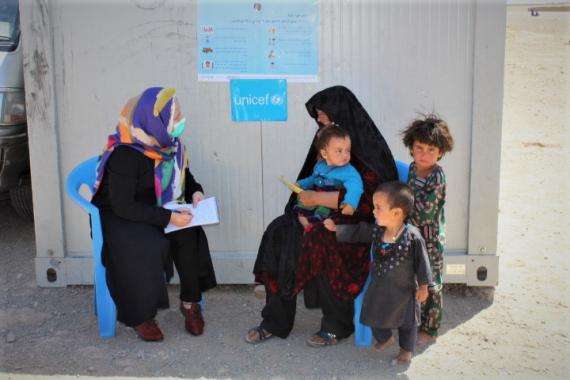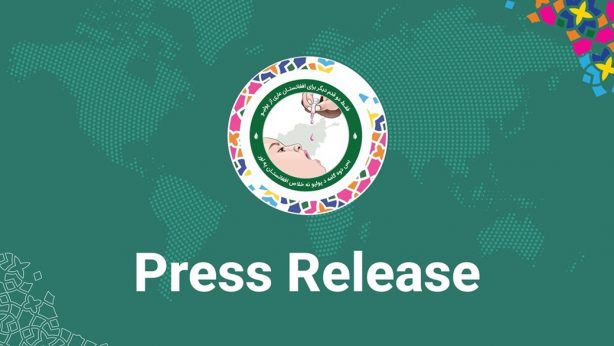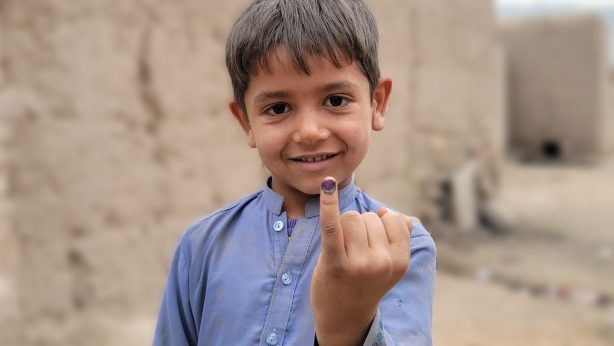Amid COVID-19 Crisis, Polio Workers Aid Communities in Crisis

Herat, Afghanistan, 10 July 2020 – Amid the long-lasting conflict in Afghanistan, the recent COVID-19 outbreak has deepened the humanitarian crisis in the country. Restrictions on movement and closure of businesses have deepened poverty amongst the most vulnerable. Herat Province bordering Iran has been the epicenter of the Corona Virus in Afghanistan, with first case reported in late February. As the outbreak hit the region, over 130,000 Afghan migrant laborers in Iran crossed the border back to Herat and neighboring cities due to growing unemployment. As of July, Herat Province recorded 4,887 COVID-19 cases with 130 deaths against the 34,500 cases so far reported in Afghanistan.

Call center aids community with life-saving information
When COVID-19 hit Herat, the UNICEF’s Polio programme responded to the crisis by setting up free calls centre for health consultations from renowned health personnel and deployed 75 female mobilisers and vaccinators at health facilities to sustain provision of immunization services at health facilities and provide baby blankets to newborn children. Female mobilizers are supporting most at risk and vulnerable households with hygiene supplies.
Among the community and health workers is 24-year-old physician Salma Behboozadeh who works at the call centre. Salma explains the centre offers 14-hours services to respond to queries on Corona Virus. ‘’We receive more than 100 calls a day. When positive cases are identified, we follow up with the patients and families about treatment and self-care,” says Salma. “We assure the corona patients that the virus affects everyone, and there is no need to be ashamed if infected. We provide the necessary information and encourage them to see the doctor if they have are experiencing any of the symptoms.’’

Some 75,000 internally displaced persons (IDPs) reside in tents and muddy rooms at Herat IDP camp. The Covid-19 pandemic has worsened an already dire situation amongst internally displaced families, with women and children bearing the brunt. Gol Jan an IDP mother of four children residing for three years in the camp laments: ‘We lost our income because my husband lost his job due to the Covid-19 outbreak.” “We can hardly afford to house, feed and clothe our children. The children stopped going to school due to schools closure and we are afraid of dying from Covid-19 virus.” The polio programme provides Gul Jan and other women with information on limiting the risk of Corona Virus, supplies them with hygiene kits for personal needs and baby blankets once the children are vaccinated against polio and other childhood diseases. Not far from Gul Jan’s tent, 63-year-old Saleh Mohammed lives in a tent with 10 family members, including grandchildren. ‘’Our life is in danger, especially myself and my wife. We are old and disabled,” says Gul. “UNICEF has supported in protecting the life of my grandchildren through vaccination and provision of hygiene kits, soap and baby blankets.”

At the camp, polio programme worker Monira Firoozi provides caregivers who visit the mobile health clinic with COVID-19, Polio, nutrition, health and hygiene information. ‘’Communities are afraid of being infected with the Corona Virus whilst at the same time they must make a living, and this increases their risk to being infected,” says Monira. “Through the polio programme, we help them with soap bars, hygiene kits and vaccinate their children.’
Health facilities serve as hubs for COVID-19 interpersonal communication.
Women continue to be in the forefront in the Covid-19 and Polio fight. In Injil District at Jebril Health Facility, Tahereh Khodadi of the polio programme continues to interact with the caregivers and provides insights to their concerns about COVID-19, mother and child health. Tahereh sees her job as critical at the time of crisis. ‘’My role complements health messages relayed by the media which are one-way communication as I interact with people on a two-way communication basis. Most of the clinic visitors are women, so we can discuss comfortably together about their health concerns and COVID-19,’’ she says.

Tahereh’s help in the crisis is appreciated by Hossein Ehsan, a 25-year-old young man who lives with his six family members. He comments ‘’ I understand well the information provided by Tahere as it is simple and in a dialect of our local community”’.
Since the COVID-19 outbreak in Western Afghanistan, the polio programme helped 55,000 caregivers by supplying 200,000 soap bars, 35,000 baby blankets and 30,000 hygiene kits. Despite the halt of the polio campaigns, human resources and assets from the polio programme have been scaled up support for routine immunization services at health facilities, with over 18,000 children being vaccinated against polio and other childhood diseases.
By Ahmad Shah Ahmad and Tamara Abu Sham
Originally Posted on UNICEF Afghanistan.


